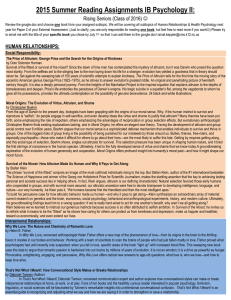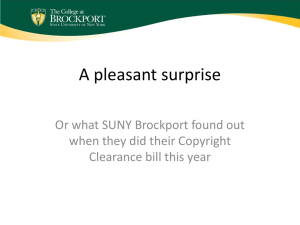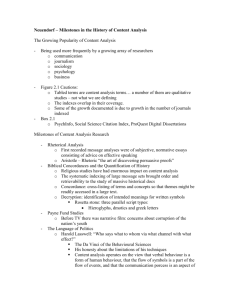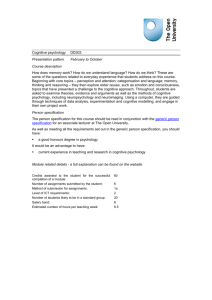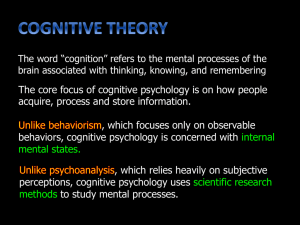Review the google.doc and choose one book from your
advertisement
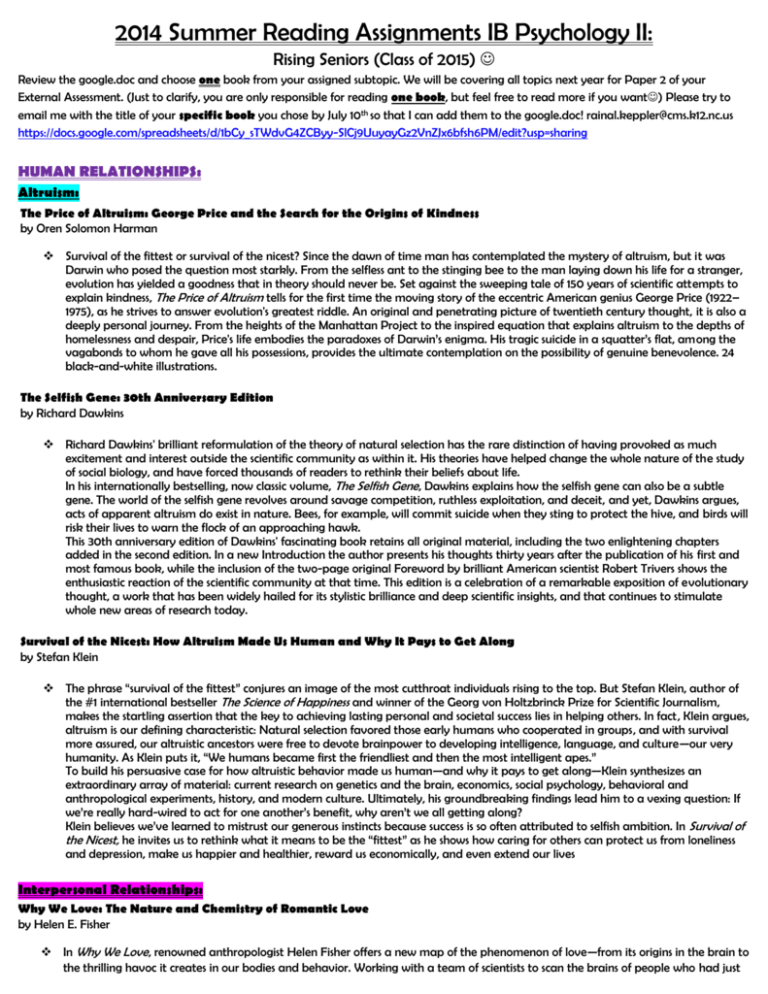
2014 Summer Reading Assignments IB Psychology II: Rising Seniors (Class of 2015) Review the google.doc and choose one book from your assigned subtopic. We will be covering all topics next year for Paper 2 of your External Assessment. (Just to clarify, you are only responsible for reading one book, but feel free to read more if you want) Please try to email me with the title of your specific book you chose by July 10th so that I can add them to the google.doc! rainal.keppler@cms.k12.nc.us https://docs.google.com/spreadsheets/d/1bCy_sTWdvG4ZCByy-SlCj9UuyayGz2VnZJx6bfsh6PM/edit?usp=sharing HUMAN RELATIONSHIPS: Altruism: The Price of Altruism: George Price and the Search for the Origins of Kindness by Oren Solomon Harman Survival of the fittest or survival of the nicest? Since the dawn of time man has contemplated the mystery of altruism, but it was Darwin who posed the question most starkly. From the selfless ant to the stinging bee to the man laying down his life for a stranger, evolution has yielded a goodness that in theory should never be. Set against the sweeping tale of 150 years of scientific attempts to explain kindness, The Price of Altruism tells for the first time the moving story of the eccentric American genius George Price (1922– 1975), as he strives to answer evolution's greatest riddle. An original and penetrating picture of twentieth century thought, it is also a deeply personal journey. From the heights of the Manhattan Project to the inspired equation that explains altruism to the depths of homelessness and despair, Price's life embodies the paradoxes of Darwin’s enigma. His tragic suicide in a squatter’s flat, among the vagabonds to whom he gave all his possessions, provides the ultimate contemplation on the possibility of genuine benevolence. 24 black-and-white illustrations. The Selfish Gene: 30th Anniversary Edition by Richard Dawkins Richard Dawkins' brilliant reformulation of the theory of natural selection has the rare distinction of having provoked as much excitement and interest outside the scientific community as within it. His theories have helped change the whole nature of the study of social biology, and have forced thousands of readers to rethink their beliefs about life. In his internationally bestselling, now classic volume, The Selfish Gene, Dawkins explains how the selfish gene can also be a subtle gene. The world of the selfish gene revolves around savage competition, ruthless exploitation, and deceit, and yet, Dawkins argues, acts of apparent altruism do exist in nature. Bees, for example, will commit suicide when they sting to protect the hive, and birds will risk their lives to warn the flock of an approaching hawk. This 30th anniversary edition of Dawkins' fascinating book retains all original material, including the two enlightening chapters added in the second edition. In a new Introduction the author presents his thoughts thirty years after the publication of his first and most famous book, while the inclusion of the two-page original Foreword by brilliant American scientist Robert Trivers shows the enthusiastic reaction of the scientific community at that time. This edition is a celebration of a remarkable exposition of evolutionary thought, a work that has been widely hailed for its stylistic brilliance and deep scientific insights, and that continues to stimulate whole new areas of research today. Survival of the Nicest: How Altruism Made Us Human and Why It Pays to Get Along by Stefan Klein The phrase “survival of the fittest” conjures an image of the most cutthroat individuals rising to the top. But Stefan Klein, author of the #1 international bestseller The Science of Happiness and winner of the Georg von Holtzbrinck Prize for Scientific Journalism, makes the startling assertion that the key to achieving lasting personal and societal success lies in helping others. In fact, Klein argues, altruism is our defining characteristic: Natural selection favored those early humans who cooperated in groups, and with survival more assured, our altruistic ancestors were free to devote brainpower to developing intelligence, language, and culture—our very humanity. As Klein puts it, “We humans became first the friendliest and then the most intelligent apes.” To build his persuasive case for how altruistic behavior made us human—and why it pays to get along—Klein synthesizes an extraordinary array of material: current research on genetics and the brain, economics, social psychology, behavioral and anthropological experiments, history, and modern culture. Ultimately, his groundbreaking findings lead him to a vexing question: If we’re really hard-wired to act for one another’s benefit, why aren’t we all getting along? Klein believes we’ve learned to mistrust our generous instincts because success is so often attributed to selfish ambition. In Survival of the Nicest, he invites us to rethink what it means to be the “fittest” as he shows how caring for others can protect us from loneliness and depression, make us happier and healthier, reward us economically, and even extend our lives Interpersonal Relationships: Why We Love: The Nature and Chemistry of Romantic Love by Helen E. Fisher In Why We Love, renowned anthropologist Helen Fisher offers a new map of the phenomenon of love—from its origins in the brain to the thrilling havoc it creates in our bodies and behavior. Working with a team of scientists to scan the brains of people who had just fallen madly in love, Fisher proved what psychologists had until recently only suspected: when you fall in love, specific areas of the brain "light up" with increased blood flow. This sweeping new book uses this data to argue that romantic passion is hardwired into our brains by millions of years of evolution. It is not an emotion; it is a drive as powerful as hunger. Provocative, enlightening, engaging, and persuasive, Why We Love offers radical new answers to age-old questions: what love is, who we love—and how to keep love alive. *Dangerous Passion by David M. Buss *The content of this book is for mature readers. If you/your child is uncomfortable with the material, please choose another book Why do men and women cheat on each other? How do men really feel when their partners have sex with other men? What worries women more -- men who turn to other women for love or men who simply want sexual variety in their lives? Can the jealousy husbands and wives experience over real or imagined infidelities be cured? Should it be? In this surprising and engaging exploration of men's and women's darker passions, David Buss, acclaimed author of The Evolution of Desire, reveals that both men and women are actually designed for jealousy. Drawing on experiments, surveys, and interviews conducted in thirty-seven countries on six continents, as well as insights from recent discoveries in biology, anthropology, and psychology, Buss discovers that the evolutionary origins of our sexual desires still shape our passions today. According to Buss, more men than women want to have sex with multiple partners. Furthermore, women who cheat on their husbands do so when they are most likely to conceive, but have sex with their spouses when they are least likely to conceive. These findings show that evolutionary tendencies to acquire better genes through different partners still lurk beneath modern sexual behavior. To counteract these desires to stray -- and to strengthen the bonds between partners -- jealousy evolved as an early detection system of infidelity in the ancient and mysterious ritual of mating. Buss takes us on a fascinating journey through many cultures, from pre-historic to the present, to show the profound evolutionary effect jealousy has had on all of us. Only with a healthy balance of jealousy and trust can we be certain of a mate's commitment, devotion, and true love. The Evolution Of Desire - Revised Edition 4 by David M. Buss If we all want love, why is there so much conflict in our most cherished relationships? To answer this question, says noted psychologist David Buss, we must look into our evolutionary past. Based on the most massive study of human mating ever undertaken, encompassing more than ten thousand people of all ages from thirty-seven cultures worldwide, The Evolution of Desire is the first book to present a unified theory of human mating behavior. Now in a revised and updated edition, Buss's classic presents the latest research in the field, including startling new discoveries about the evolutionary advantages of infidelity, orgasm, and physical attractiveness. The New Psychology of Love by Robert J. Sternberg Love . . . What is it? Can we define it? What is its role in our lives? What causes love, and what dooms it? No single theory adequately answers all our questions about the nature of love, yet there are many theories that can contribute to our understanding of it. This fascinating book presents the full range of psychological theories on love—biological, taxonomical, implicit, cultural—updated with the latest research in the field. Robert Sternberg and Karin Weis have here gathered more than a dozen expert contributors to address questions about defining love, the evidence for competing theories, and practical implications. Taken together, these essays offer a comprehensive and engaging comparison of contemporary data and theories. As a follow up to The Psychology of Love, which was published in 1988 and edited by Robert Sternberg and Michael Barnes, this new collection engages with the many changes in the study of love in recent years. New theories are introduced as are modifications to existing theories. Focusing not on a single point of view but on the entire range of current theories, The New Psychology of Love provides today’s definitive account of the nature of love. Violence: The Bully Society: School Shootings and the Crisis of Bullying in America's Schools (Intersections: Transdisciplinary Perspectives on Genders and Sexualities) by Jessie Klein In today’s schools, kids bullying kids is not an occasional occurrence but rather an everyday reality where children learn early that being sensitive, respectful, and kind earns them no respect. Jessie Klein makes the provocative argument that the rise of school shootings across America, and childhood aggression more broadly, are the consequences of a society that actually promotes aggressive and competitive behavior. The Bully Society is a call to reclaim America’s schools from the vicious cycle of aggression that threatens our children and our society at large. Heartbreaking interviews illuminate how both boys and girls obtain status by acting “masculine”—displaying aggression at one another’s expense as both students and adults police one another to uphold gender stereotypes. Klein shows that the aggressive ritual of gender policing in American culture creates emotional damage that perpetuates violence through revenge, and that this cycle is the main cause of not only the many school shootings that have shocked America, but also related problems in schools, manifesting in high rates of suicide, depression, anxiety, eating disorders, self-cutting, truancy, and substance abuse. After two decades working in schools as a school social worker and professor, Klein proposes ways to transcend these destructive trends— transforming school bully societies into compassionate communities Why Kids Kill: Inside the Minds of School Shooters by Peter F. Langman In the horrific aftermath of school shootings, distraught communities struggle to make sense of these seemingly senseless acts. Despite massive media coverage, we know little about what drives young perpetrators or how they rationalize their acts. In this breakthrough analysis, Dr. Peter Langman presents the psychological causes of school shootings and offers unprecedented insight into why certain teens exhibit the potential to kill. He shows how to identify early signs of possible violence and offers preventative measures that parents and educators can take to protect their communities. Evil: Inside Human Violence and Cruelty by Roy F. Baumeister Why is there evil, and what can scientific research tell us about the origins and persistence of evil behavior? Considering evil from the unusual perspective of the perpetrator, Baumeister asks, How do ordinary people find themselves beating their wives? Murdering rival gang members? Torturing political prisoners? Betraying their colleagues to the secret police? Why do cycles of revenge so often escalate? Baumeister casts new light on these issues as he examines the gap between the victim's viewpoint and that of the perpetrator, and also the roots of evil behavior, from egotism and revenge to idealism and sadism. A fascinating study of one of humankind's oldest problems, Evil has profound implications for the way we conduct our lives and govern our society. Prisoners of Hate: The Cognitive Basis of Anger, Hostility, and Violence by Aaron T. Beck World-renowned psychiatrist Dr.Aaron T. Beck, widely hailed as the father of cognitive therapy, presents a revolutionary and eyeopening look at destructive behavior in Prisoners of Hate. He applied his established principles on the relationships between thinking processes and the emotional and behavioral expressions to the dark side of humanity. In fascinating detail, he demonstrates that basic components of destructive behavior-domestic abuse, bigotry, genocide, and war-share common patterns with everyday frustrations in our lives. A book that will radically alter our thinking on violence in all its forms, Prisoners of Hate, provides a solid framework for remedying these crucial problems. DEVELOPMENTAL PSYCHOLOGY: Cognitive Development: What's Going on in There? : How the Brain and Mind Develop in the First Five Years of Life by Lise Eliot As a research neuroscientist, Lise Eliot has made the study of the human brain her life's work. But it wasn't until she was pregnant with her first child that she became intrigued with the study of brain development. She wanted to know precisely how the baby's brain is formed, and when and how each sense, skill, and cognitive ability is developed. And just as important, she was interested in finding out how her role as a nurturer can affect this complex process. How much of her baby's development is genetically ordained-and how much is determined by environment? Is there anything parents can do to make their babies' brains work better--to help them become smarter, happier people? Drawing upon the exploding research in this field as well as the stories of real children, What's Going On in There? is a lively and thought-provoking book that charts the brain's development from conception through the critical first five years. In examining the many factors that play crucial roles in that process, What's Going On in There? explores the evolution of the senses, motor skills, social and emotional behaviors, and mental functions such as attention, language, memory, reasoning, and intelligence. This remarkable book also discusses: how a baby's brain is "assembled" from scratch the critical prenatal factors that shape brain development how the birthing process itself affects the brain which forms of stimulation are most effective at promoting cognitive development how boys' and girls' brains develop differently how nutrition, stress, and other physical and social factors can permanently affect a child's brain Brilliantly blending cutting-edge science with a mother's wisdom and insight, What's Going On in There? is an invaluable contribution to the nature versus nurture debate. Children's development is determined both by the genes they are born with and the richness of their early environment. This timely and important book shows parents the innumerable ways in which they can actually help their children grow better brains. Genie: A Scientific Tragedy by Russ Rymer The compelling story of a young woman's emergence into the world after spending her first 13 years strapped to a chair, and her rescue and exploitation by scientists hoping to gain new insight into language acquisition. Dani's Story: A Journey from Neglect to Love by Diane Lierow The story that captivated a nation; how a horribly neglected little girl was rescued by her loving adoptive parents In July 2005, a sixyear-old girl named Danielle was removed from her Florida home after authorities found her living in bug-ridden squalor, subjected to horrific neglect and so damaged by her own mother that recovery seemed hopeless. But hope was waiting for Dani, and help. In October 2007, Bernie and Diane Lierow, a hard-working couple with five boys of their own, adopted her and utterly transformed her life. This book tells the moving story of how the Lierows rescued Dani and helped her recover to the point where she can not only communicate, something once thought impossible, but can say of herself, "I pretty."The Lierows describe their struggle to adopt Dani, how they bonded with her and made a home for her, how they satisfied her craving for contact and stimuli, how Dani began to overcome her severe learning disabilities, how she learned she no longer had to steal food, and how their son Willie may be the greatest brother ever Social Development: Becoming Attached: First Relationships and How They Shape Our Capacity to Love by Robert Karen The struggle to understand the infant-parent bond ranks as one of the great quests of modern psychology, one that touches us deeply because it holds so many clues to how we become who we are. How are our personalities formed? How do our early struggles with our parents reappear in the way we relate to others as adults? Why do we repeat with our own children--seemingly against our will--the very behaviors we most disliked about our parents? In Becoming Attached, psychologist and noted journalist Robert Karen offers fresh insight into some of the most fundamental and fascinating questions of emotional life. Karen begins by tracing the history of attachment theory through the controversial work of John Bowlby, a British psychoanalyst, and Mary Ainsworth, an American developmental psychologist, who together launched a revolution in child psychology. Karen tells about their personal and professional struggles, their groundbreaking discoveries, and the recent flowering of attachment theory research in universities all over the world, making it one of the century's most enduring ideas in developmental psychology. In a world of working parents and makeshift day care, the need to assess the impact of parenting styles and the bond between child and caregiver is more urgent than ever. Karen addresses such issues as: What do children need to feel that the world is a positive place and that they have value? Is day care harmful for children under one year? What experiences in infancy will enable a person to develop healthy relationships as an adult, and he demonstrates how different approaches to mothering are associated with specific infant behaviors, such as clinginess, avoidance, or secure exploration. He shows how these patterns become ingrained and how they reveal themselves at age two, in the preschool years, in middle childhood, and in adulthood. And, with thought-provoking insights, he gives us a new understanding of how negative patterns and insecure attachment can be changed and resolved throughout a person's life. The infant is in many ways a great mystery to us. Every one of us has been one; many of us have lived with or raised them. Becoming Attached is not just a voyage of discovery in child emotional development and its pertinence to adult life but a voyage of personal discovery as well, for it is impossible to read this book without reflecting on one's own life as a child, a parent, and an intimate partner in love or marriage. Street Life: Poverty, Gangs, and a Ph.D. by Dr. Victor Rios Victor Rios grew up in Oakland, California in a single parent household, in poverty and on welfare. He joined a gang at the age of thirteen and by age sixteen he had dropped out of school and had been incarcerated several times. Having witnessed the tragic murder of his best friend by gang rivals, Victor hit a critical juncture in life at which point he made the decision to transform. With the support of educators and mentors, Victor redirected his attitude towards life, and returned to school to eventually acquire a Ph.D. from the University of California at Berkeley. Dr. Rios uses his personal story, and 10 years of research experience, to discuss how personal and institutional "illusions" contribute to academic failure. He speaks about how society gives young people little choice but to use their "attitude" to solve their problems and how this strategy often leads to detrimental consequences. He discusses practical pathways to transformation relevant to the lives of students. Dr. Rios speaks about his own personal transformation by taking advantage of the support that teachers and programs provided him and discusses how these efforts can be replicated. This book is written to speak to a young adult audience—those young people who live on the margins, who are often assigned texts that do not represent their lived reality, their struggles, or their experiences. Educators and youth workers can use each of the short chapters in this book as tools for discussing complicated social issues like abuse, youth violence, delinquency, fatalism, opportunity, stratification, poverty, resilience, college, positive role models, healthy choices, and personal transformation. Breaking Night: A Memoir of Forgiveness, Survival, and My Journey from Homeless to Harvard by Liz Murray Breaking Night is the stunning memoir of a young woman who at age fifteen was living on the streets, and who eventually made it into Harvard. Liz Murray was born to loving but drug-addicted parents in the Bronx. In school she was taunted for her dirty clothing and lice- infested hair, eventually skipping so many classes that she was put into a girls' home. At age fifteen, Liz found herself on the streets when her family finally unraveled. She learned to scrape by, foraging for food and riding subways all night to have a warm place to sleep. When Liz's mother died of AIDS, she decided to take control of her own destiny and go back to high school, often completing her assignments in the hallways and subway stations where she slept. Liz squeezed four years of high school into two, while homeless; won a New York Times scholarship; and made it into the Ivy League. Breaking Night is an unforgettable and beautifully written story of one young woman's indomitable spirit to survive and prevail, against all odds. Identity Development: Same Difference: How Gender Myths Are Hurting Our Relationships, Our Children, and Our Job by Rosalind Barnett & Caryl Rivers From respected academics like Carol Gilligan to pop-psych gurus like John Gray, and even the controversial Harvard President Lawrence Summers, the message has long been the same: Men and women are fundamentally different, and trying to bridge the gender gap can only lead to grief. But as the New York Times Book Review raved, Barnett and Rivers "debunk these theories in a no-nonsense way, offering a refreshingly direct (i.e. unashamedly judgmental) critique of traditional parental roles, tututting at the couples they interviewed who cling to stereotyped ideas of the family." "Blending case histories, new research and thoughtful analysis, the writers describe the divide between the sexes as a crevice, not a chasm. The good news: We're all a lot more flexible than the gender clichés let on."-Psychology Today As Nature Made Him: The Boy Who Was Raised as a Girl by John Colapinto In 1967, after a twin baby boy suffered a botched circumcision, his family agreed to a radical treatment that would alter his gender. The case would become one of the most famous in modern medicine and a total failure. As Nature Made Him tells the extraordinary story of David Reimer, who, when finally informed of his medical history, made the decision to live as a male. A macabre tale of medical arrogance, it is first and foremost a human drama of one man and one family; amazing survival in the face of terrible odds. The Gendered Society by Michael S. Kimmel Thoroughly updated and revised, the third edition of The Gendered Society explores current thinking about gender, both inside academia and in our everyday lives. Michael S. Kimmel challenges the claim that gender is limited to women's experiences--his compelling and balanced study of gender includes both masculine and feminine perspectives. Part 1 examines the latest work in biology, anthropology, psychology, and sociology; Part 2 provides an original analysis of the gendered worlds of family, education, and work; and Part 3 explores gender interactions, including friendship and love, sexuality, and violence. Kimmel makes three bold and persuasive statements about gender. First, he demonstrates that gender differences are often extremely exaggerated; in fact, he argues that men and women have much more in common than we think they do. Kimmel also challenges the pop psychologists who suggest that gender difference is the cause of inequality between the sexes; instead, he reveals that the reverse is true--gender inequality itself is the cause of the differences between men and women. Finally, he illustrates that gender is not merely an element of individual identity, but a socially constructed institutional phenomenon. A new chapter on media examines the portrayal of gender in one of the most powerful--and provocative--social institutions. Of particular interest to students, Kimmel's analysis of this dynamic, image-driven industry makes the study of gender relevant in an immediate and tangible way. Journaling Assignments: Due the first day of class You must respond to all questions that relate to the topic of the book you chose. For each question, you must respond with a thoughtful response (10 detailed sentences); please provide evidence from the book to back up your responses! (direct quotes/paraphrasing with page numbers must be included) I prefer that you type your responses (12 point font, double spaced) however, if you need to handwrite them then that will be acceptable. Be sure to number and staple all of your questions together and remember to put your name on the front. Altruism Interpersonal Relationships Violence What causes some people to be willing to risk their own life to save another person’s life? Would you be willing to risk your life for someone? Would there be any specific circumstances that would cause you to help or not to help? Do you believe that some cultures are more altruistic than others? If so, what do you think causes these differences? How do social norms impact an individual’s willingness to help a stranger? What causes someone to love another individual? Do you think that everyone is capable of loving another individual? What causes some people to become violent? What do you think allows relationships to last? Do you believe that some cultures are more violent than others? If so, what do you think causes these differences? Overall, do you think the world as a whole has become a more violent place? Justify your response Have you personally been bullied or know someone that has? How did it impact you/them? Why do you think some people bully others? What type of situations makes you angry? Do you deal with your anger in a healthy way? Research the Kitty Genovese case. Explain the case and the term/concept that relates to this case. If you were a bystander what would you have done? Do you think the concept of helping others is a learned behavior or something that we are innately born with? When you see someone in trouble what do you feel and what do you do? Why do you feel and act this way? Make 5 more journal entries about questions you may have, ideas/concepts that sparked your interest, or ideas you may disagree/agree with. Be ready to share these thoughts on the first day of class Do you think jealously helps or hinders relationships? Do you think being in a relationship is a NEED or a WANT? Justify your response What purpose do you think love serves? Do you think conflicts in relationships are caused by an individual’s personality or due to outside factors and situations within the environment? Make 5 more journal entries about questions you may have, ideas/concepts that sparked your interest, or ideas you may disagree/agree with. Be ready to share these thoughts on the first day of class Have you ever witnessed violence and how did it impact you? Do you think that violence can be reduced? If so what are some ideas/programs that can help reduce violence? Make 5 more journal entries about questions you may have, ideas/concepts that sparked your interest, or ideas you may disagree/agree with. Be ready to share these thoughts on the first day of class Journaling Assignments: Due the first day of class You must respond to all questions that relate to the topic of the book you chose. For each question, you must respond with a thoughtful response (10 detailed sentences); please provide evidence from the book to back up your responses! (direct quotes/paraphrasing with page numbers must be included) I prefer that you type your responses (12 point font, double spaced) however, if you need to handwrite them then that will be acceptable. Be sure to number and staple all of your questions together and remember to put your name on the front. Cognitive Development Social Development Identity Development Do you think that nature or nurture has a larger impact on cognitive development? Explain your response Do you think that nature or nurture has a larger impact on social development? Explain your response To what extent does contact and stimuli play a role in cognitive development? Discuss whether family or society has a larger impact on social development. Do you think that nature or nurture has a larger impact on identity development? Explain your response Do you think that it is important for a child to conform to society’s gender roles? How do you think conforming or choosing not to conform can help or hinder a child’s development? Do you believe that there is a major or minor difference between males and females? What are these differences and do they help or hinder an individual? Do you believe that there is a major or minor difference between males and females when it comes to cognitive development? Where do these expectations or differences come from? Some psychologists believe that the ability to development language is an innate quality while others believe that we are a “blank slate” and must be modeled and learn language development. Which side do you agree with and why? Many medical professionals believe in the idea of the “critical first five years” in order for a child to have successful cognitive development. Cognitively speaking, why is this important? Research a famous psychologist that has done extensive research in cognitive development. Explain his/her theory/arguments. From the book you read and from a psychological perspective, do you believe that it is possible to take control of one’s own destiny? In your opinion what does this idea mean? Make 5 more journal entries about questions you may have, ideas/concepts that sparked your interest, or ideas you may disagree/agree with. Be ready to share these thoughts on the first day of class Research and define the term resilience. To what extent does this impact social development? To what extent does developing an attachment (to a person, parents, friend, mentor, etc) play a role in an individual’s social development? What do children need to feel that the world is a positive place and that they have value? To what extent does trauma, poverty, and abuse impact an individual’s social development? From the book you read and from a psychological perspective, do you believe that it is possible to take control of one’s own destiny? In your opinion what does this idea mean? Make 5 more journal entries about questions you may have, ideas/concepts that sparked your interest, or ideas you may disagree/agree with. Be ready to share these thoughts on the first day of class Discuss whether the gender gap is continually closing or widening? Justify your response Do you believe that a child’s identity is at the mercy of his/her parent’s decisions in the way he/she is raised? Do you believe that gender difference is the cause of inequality between the sexes or that instead, gender inequality itself is the cause of the differences between men and women? Justify your response From the book you read and from a psychological perspective, do you believe that it is possible to take control of one’s own destiny? In your opinion what does this idea mean? Make 5 more journal entries about questions you may have, ideas/concepts that sparked your interest, or ideas you may disagree/agree with. Be ready to share these thoughts on the first day of class
